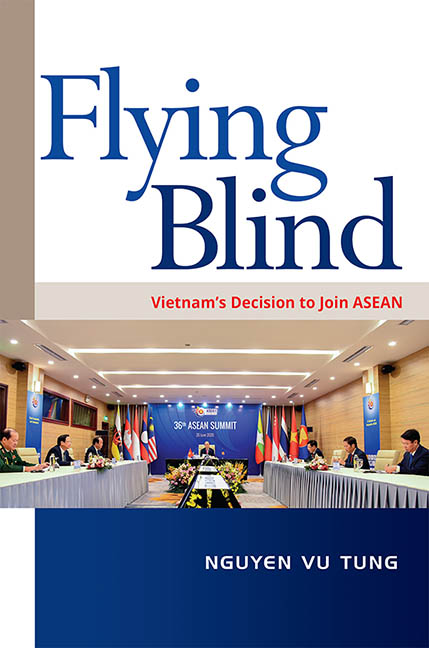Book contents
- Frontmatter
- Contents
- Acknowledgements
- Glossary
- 1 Introduction
- 2 The Paris Agreement and Vietnam: ASEAN Relations in the Early 1970s
- 3 1978 to 1985: Coexistence Between Two Opposing Groups
- 4 Joining ASEAN: Political and Strategic Factors
- 5 Jumping on a Moving Train: Vietnam Joins ASEAN
- 6 ASEAN Membership and Vietnam’s Shifting National Identity
- 7 Conclusion
- References
- Index
- The Author
- Frontmatter
- Contents
- Acknowledgements
- Glossary
- 1 Introduction
- 2 The Paris Agreement and Vietnam: ASEAN Relations in the Early 1970s
- 3 1978 to 1985: Coexistence Between Two Opposing Groups
- 4 Joining ASEAN: Political and Strategic Factors
- 5 Jumping on a Moving Train: Vietnam Joins ASEAN
- 6 ASEAN Membership and Vietnam’s Shifting National Identity
- 7 Conclusion
- References
- Index
- The Author
Summary
From the time of the 1986 Thirteenth Politburo Resolution that stated, “We will support peaceful coexistence between the Indochinese and ASEAN countries and will not see relations between Vietnam, Laos, and Kampuchea and ASEAN countries as socialism versus capitalism” to Hanoi's enhanced interaction and socialization with ASEAN countries between 1990 and 1994, the following factors seemed to have influenced the Vietnam-ASEAN relations in a decisive way.
(1) The disintegration of the Soviet bloc and the collapse of the Soviet Union, which made Vietnam's search for a new identity to protect its survival of the communist regime in Vietnam an urgent task.
(2) Beijing's rejection of Hanoi's proposal to establish a new mode of Sino-Vietnamese relations based on communist identity, which made the search for a new and non-communist identity imperative.
(3) New understanding and awareness of ASEAN's importance to the overall developmental and foreign policy of Vietnam as well as the enhancement of the new posture of Vietnam in its regional and international relations.
(4) New awareness of commonalities between Vietnam and ASEAN countries in terms of history and culture as well as developmental goals and regime survival, gained through a process of intense interactions and socialization between Vietnam and ASEAN member states.
These are the four main factors, which formed a “matrix of dynamics” that involved new ideas, choices, and processes and in fact informed the decision by Hanoi first to improve relations with ASEAN countries and then to join ASEAN.
At first glance, it might seem that Hanoi's policymakers based their decision to join ASEAN on the considerations that attached great importance to nationalism, and national and regime interests. Yet a closer look suggests a more complicated picture. As previous chapters have shown, Hanoi did not hope, and could not hope, to turn ASEAN into a military alliance and help to improve its position vis-à-vis Beijing. Moreover, there was no substantial surge in economic and political gains in the period between the improvement of Vietnam-ASEAN relations and Vietnam's membership in ASEAN. Further, additional economic pressures and challenges were exerted on Vietnam due to its ASEAN membership.
- Type
- Chapter
- Information
- Flying Blind , pp. 201 - 212Publisher: ISEAS–Yusof Ishak InstitutePrint publication year: 2021



